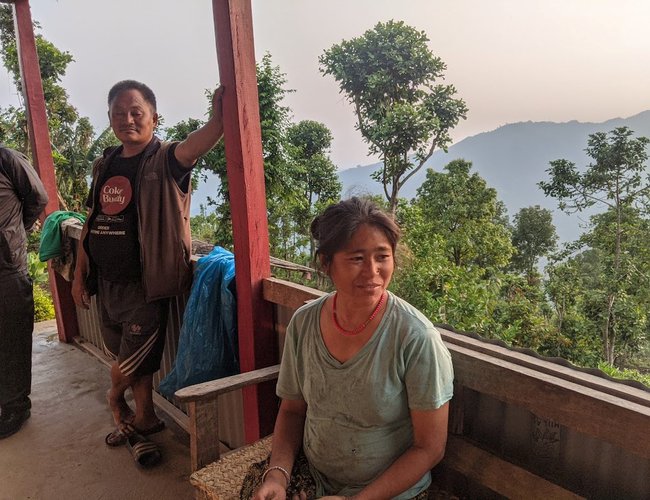
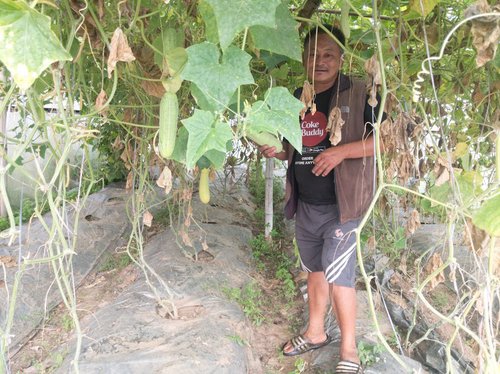
Chhatra Man Rai, 42, returned from Malaysia after seven years of work, has experienced significant changes in his life over the past four years. Returning with a debt of over Rs. 200,000, Rai, a resident of Urleni village, Ward 14 of Diktel-Rupakot-Majhuwgadhi Municipality, 500 kilometers east of Kathmandu, was unsure how to start a new life and generate income to meet his family's needs. His primary concern was repaying the loan, which carried an annual interest rate of 36 percent.
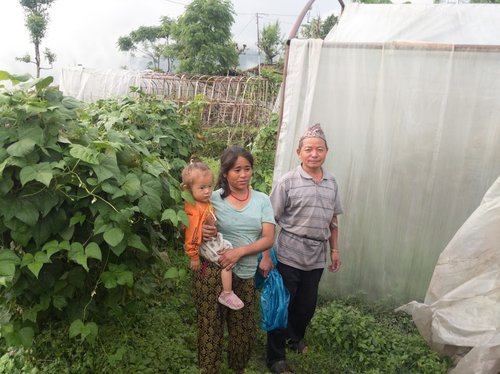
Recognizing the high demand for seasonal vegetables in local markets and the district headquarters of Diktel, Rai, along with eight colleagues—Aviraj Thulung, Madan Wahadur Rai, Ramesh Rai, Cham Kumar Rai, Deepak Rai, Anchal Rai, Sunil Rai, and Major Rai—started vegetable farming with their personal investments.
For all the men involved, the support from women has been crucial. The women now play a vital role in marketing the products and managing the savings.
Many youths like Rai, who left the village seven years ago with no hope of achieving economic prosperity through subsistence farming, now see a brighter future through the commercialization of agriculture.
Chhatra Man Rai shared that he initially went abroad with the hope of keeping his farming family happy, educating his children in good schools, buying new clothes, and appearing prosperous in village society. However, none of these dreams materialized. "My earnings in foreign countries were just enough to feed myself and pay interest. I occasionally sent money back home," he said.
After not finding easy work or an adequate salary as expected in foreign countries, their old dreams were shattered. They returned to their village at different times, unable even to repay the loan.
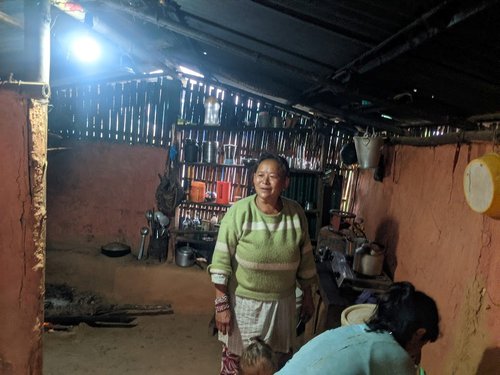
According to Jiban Shrestha, Migration Coordinator at the RERP (SAMRIDDHI) Project Management Office (PMO), a total of 6,333 migrant families and returnees have benefited from the supply chain out of the total 11,522 beneficiaries. He emphasized that the Agriculture Supply Chain plays a crucial role, encompassing programs such as cluster-based initiatives, market-led commercial production, and enabled business and technical services. Additionally, the Agri Policy Strategy is highlighted as a key focus area of the project.
Overall, 181,133 individuals have benefited from the project in various aspects including supply chain improvements, access to decent jobs, rural financing, and migration support. Among these beneficiaries, 39,585 are migrant families and returnees.
Turning a Will into a Way
As the saying goes, "Where there is a will, there is a way." Roaming around the district headquarters and Diktel Municipality, Chhatra Man Rai and his group connected with the RERP SAMRIDDHI project, which became a game-changer for them.
Their contact with the experts from RERP-SAMRIDDHI marked the first step toward prosperity. The uncertainty they faced began to dissipate, and they were able to double their profit margin, recovering the losses from their first year.
Jointly implemented by IFAD and MoICS, one of the key objectives of the project is to promote self-employment and small businesses, as well as microenterprises, that can generate better incomes for migrant returnees and women from poor and marginalized communities. Rai and his group fit perfectly into this target demographic.
With technical skills, knowledge, and other support from SAMRIDDHI, including market chain connections, Rai and his group made significant progress. They doubled their production and sales, earning substantial income from the market.
The support of the PRSP SAMRIDDHI Project’s green vegetable supply chain program has transformed the lives of Rai and his colleagues, demonstrating that success is achievable in their village.
In just four years, each family began earning around Rs. 500,000 ($3,000) and saving up to Rs. 200,000 ($1,300) annually. This newfound financial stability has convinced them to abandon plans of working abroad permanently. Some earn slightly less, depending on the size of their farming operations.
“When you can earn such substantial income at home, there's no reason to consider going abroad for work,” said Rai, who plans to expand their farming areas and increase production in the coming years.
Cham Kumar Rai, a group member, now earns between Rs. 500,000 and Rs. 700,000 ($3,000-$4,000) per year by cultivating vegetables on 12 ropanies (0.6 hectares) of land.
Learning and Growing
In the first year, Chhatra Man Rai and his group learned that technical knowledge and farming skills are prerequisites for the commercialization of agriculture. By using high-quality seeds, homemade organic fertilizers, and strategic cropping patterns and timing, their production significantly increased. They discovered that productivity improved by utilizing self-made solutions and organic fertilizers, moving away from traditional farming practices that relied solely on cattle manure and conventional seeds.
The RERP provided not only technical support but also market linkage. Despite producing vegetables, the farmers initially struggled to get proper prices due to unhealthy competition, often undercutting each other to sell the cheapest produce.
Formation of a Group
To achieve fair prices and market access, Rai and other producers from nearby villages explored the possibility of collective farming and marketing. Facilitated by RERP, the producers and market representatives signed mutual agreements. Five localities with potential for water and vegetable production were formed into clusters to start collective production and marketing.
Recognizing the importance of collective farming and the need for a more formal group, Rai established the Urbara Krishak Samuha, a group comprising 20 returnee migrants from the village. Working in a group provided numerous benefits, including access to concessional loans for expanding land, a health welfare fund for treatment, and vehicles for transporting vegetables to the market.
With support from the SAMRIDDHI project, Urleni in Diktel-Rupakot-Majhuwagadhi Municipality, Ward 14, has transformed from a subsistence-based area into a hub for commercial vegetable farming. The area now supplies over 80 percent of the vegetables required in the district headquarters up to Haleshi.
Success Breeds Growth
"Having seen our success over the last four years, other villagers are also growing vegetables. From the initial 9 families, there are now 50 families involved. Our group has grown to 25 members, including 15 women and 10 men," said Rai.
Since partnering with RERP, awareness among farmers has increased. The group has enhanced its trading power, facilitation, coordination, and technical skills.
As their farming areas expanded, the group began recruiting local youths, providing both full-time and part-time employment as helpers and laborers.
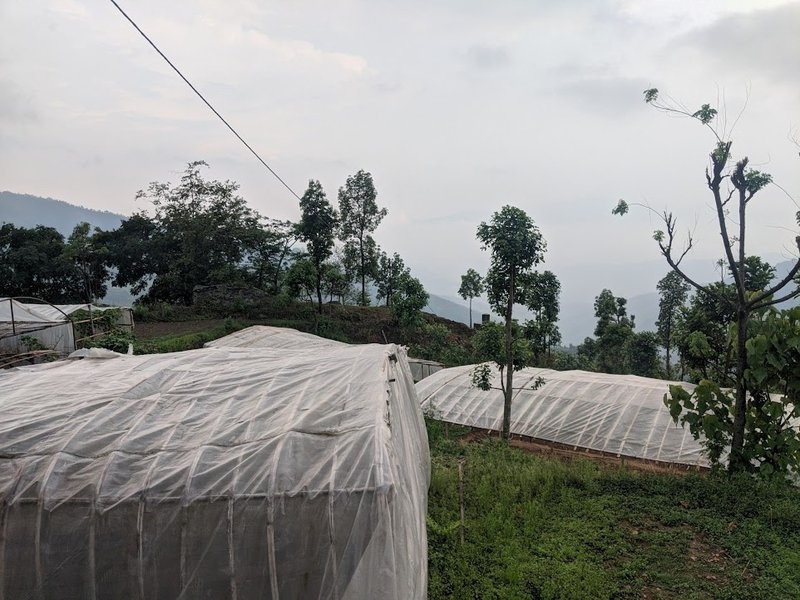
Grateful towards RERP
Learning from the cash crunch in the first year and the high interest rates on external loans, Urbara Krishak Samuha established an emergency fund. Each member contributes Rs. 125 ($1) monthly, and 20 percent of the total vegetable sales also go into the fund.
These two emergency funds serve different purposes: one for individual needs and the other for group expenses, such as paying employee salaries.
The Urbara Krishak Samuha fund now holds Rs. 500,000 in savings, owns a three-wheeler worth Rs. 500,000, and has purchased 10 Dhur (0.0016929 hectares) of land in Itahari last year for Rs. 700,000 ($5,500).
"We use the three-wheeler to transport vegetables from the village to the market and also rent it out. Since we don’t have other investment avenues, we have invested in real estate in the Terai, hoping to double our investment," said Rai.
Among the eight groups, Urbara Krishak Samuha is the first and most successful group of returnee migrants, unemployed youths, and women in Khotang.
These groups have demonstrated how the commercialization of agriculture can reintegrate returnee migrants into their families, generate substantial income, and provide jobs to unemployed youths and women.
The Journey of Urbara Krishak Samuha
For discussing market strategies, member needs, and production plans, Urbara Krishak Samuha holds a group meeting on the 5th of every month. During these meetings, they address collective questions and review income and expenditure reports. Each member takes turns performing labor tasks according to a rotational schedule. Rai has implemented an accounting system in every household to manage income and expenses, minimizing wasteful spending.
"Using tunnels, sprinkle irrigation, high-value seeds, and other modern techniques, I earned Rs. 500,000 ($3,000) in the first year. It felt like a miracle. The land, which rarely produced enough food to feed my family for six months, generated such a huge income. I paid off Rs. 300,000 in loans to local lenders and gave Rs. 200,000 to my wife for savings," said Rai. "Over the last four years, my journey has been quite satisfactory. My son and three daughters are now living in a rented room and pursuing bachelor's and higher secondary education."
Listening to her husband's story, Januka Rai added, "When my husband was abroad, my bank account had no savings. The money he sent wasn't even enough to buy food, let alone pay for our children's school fees. Growing vegetables has drastically increased our income, benefiting women as well."
With RERP's support, effective accounting systems and a farmers’ welfare fund have been established. The group's goal is to encourage young people who went abroad to return to the village and become professionals in agriculture.
Rai emphasizes that SAMRIDDHI is not just about money but also about the courage to become professionals. Collective farming has gained significant attention, and the local government has honored the project and its staff with letters of appreciation.
**Reintegrating Returnees: The Impact of RERP on Nepalese Migrants**
According to the Department of Foreign Employment, around 700,000 Nepalese are returning from foreign employment. Rai is among the few who have successfully reintegrated into their families, while tens of thousands of returnees remain unaccounted for. In this context, the lessons learned from the Rural Enterprise and Remittance Project (RERP) can be a game changer for other migrant returnees.
“The Ministry is working to introduce a scheme to reintegrate returnee migrants and provide jobs to the spouses of migrant workers. Both will support the federal government’s target to minimize the investment of remittances in unproductive sectors,” said Madan Dahal, Joint Secretary at the Ministry of Labor, Employment, and Social Security. “The Ministry can consider implementing good practices and lessons from RERP.”
IFAD’s Rural Enterprises and Remittances Project (SAMRIDDHI) works with migrant families to develop and improve on-farm and off-farm enterprises in rural areas. It also helps young people enter the labor market by facilitating the acquisition of technical and vocational skills, apprenticeships, access to finance, and entrepreneurial aspirations. As a result, it is well-positioned to support the government in managing returning workers.
“As the project nears completion, over 200,000 poor women and marginalized communities, including returnee migrants, have benefited. The training and skills provided ensure long-term sustainability. The credit for the project’s success also goes to IFAD’s headquarters and the Nepal country team for their regular guidance and unwavering support. The supervision and guidance of IFAD’s mission team have been instrumental in achieving our targets,” said Saroj Kumar Guragain, Project Manager.
Insights from IFAD's RERP
“The project has shown that reliable market access enhances productivity, increases incomes, and strengthens food security. If appropriate measures are taken to reduce market risks and unequal market power, poor farmers could greatly benefit,” said Sanjeev Kumar Shrestha, National Consultant (Value Chain & Markets) at the International Fund for Agricultural Development (IFAD).
At a time when many rural producers face significant challenges in accessing markets to sell their goods, farmers in remote rural Khotang are securing proper prices for their produce.
Despite being constrained by their remote location, high transportation costs, limited knowledge, and a lack of business skills and effective organization, farmers in Khotang are able to reap benefits.
Nepal is the top recipient of remittances as a share of GDP in South Asia and the fifth-most remittance-dependent economy (28.6 percent) in the world. Remittances to Nepal have dramatically increased over the last decade, from US$2.54 billion to US$12 billion. One of the objectives of the SAMRIDDHI project is to support returnee migrant workers in reintegrating into society.
RERP’s experiences in districts like Khotang and Bhojpur have shown that an overwhelming number of returnees are not willing to go back to foreign employment. Instead, they are interested in engaging in agriculture for livelihood opportunities.
Khotang’s returnees have demonstrated that skills training, access to finance, technology, and market linkages are prerequisites for making agriculture a successful venture.

Keshab Poudel
Poudel is the editor of New Spotlight Magazine.
- ERC Nepal Is Focused On Expanding Distribution And Transmission To The Private Sector: ERC Chair Dr. Dhital
- Jul 06, 2025
- FOURTH PROFESSOR Y.N. KHANAL LECTURE: Nepal-China Relations
- Jun 23, 2025
- Colonel JP CROSS: Centenary Birthday
- Jun 23, 2025
- BEEN: Retrofitted For Green
- May 28, 2025
- GGGI has been promoting green growth in Nepal for a decade: Dr. Malle Fofana
- May 21, 2025















